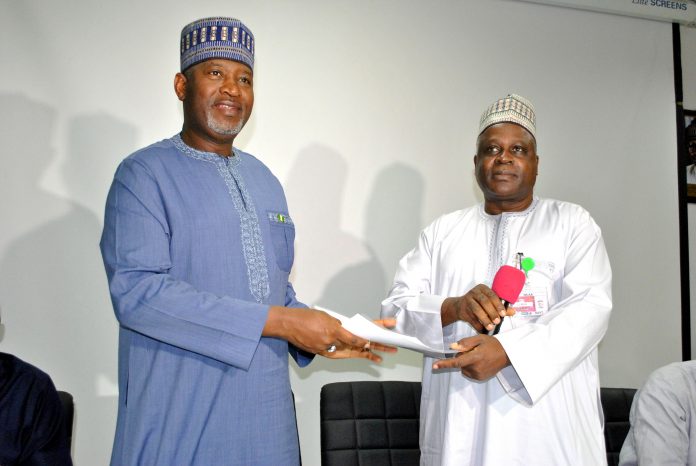
The minister of state for aviation, Senator Hadi Sirika has expressed appreciation to the Nigerian Civil Aviation Authority (NCAA) for using its personnel instead of external consultants to work and retain the Federal Aviation Administration’s CAT-1 safety status of Nigeria’s aviation sector.
Speaking in Lagos when the director general of NCAA, Capt. Muhtar Usman presented the CAT-1 certificate to him, Sirika said the agency’s capacity had improved like their counterparts in some other developed countries.
He said NCAA has a surfeit of qualified and competent personnel to ensure aviation safety in line standards and recommended practices of the International Civil Aviation Organisation (ICAO).
“I thank the director general and his team for doing us proud to retain the category one certification which has been presented to me. The travelling public might not be aware but we in aviation are aware of the feat.
“Before the audit, I was inundated with requests from various consultants that they wanted to help us in the audit for a fee. I listened to them and was told they were pivotal to our achieving Cat 1, in 2010. After hearing them out, I called the director general and asked if we needed them and he said we could do it by ourselves.
“What is even great is that apart from the fact we did it on our own without external help, NCAA equally did not borrow funds from any sister agency, the entire expenditure for this was done in-house and that is good.
“They will not see the amount of work that the NCAA does because it is not the physical infrastructure that they are used to seeing. Even some are thinking that the NCAA is the least important of the agencies. That is so far from the truth as the amount of work the NCAA puts in to ensure safety makes it the apex body,” said Sirika.
Earlier, Usman had said that the agency did not seek any external assistance for the audit stressing that “in 2010 we attained CAT-1 status; in 2014, we sustained it and in 2018, we have been able to retain it.”
“Nigeria’s civil aviation authority has come of age; we didn’t have to rely on external assistance and we did it very well,” he added.
It would be recalled that a team of FAA auditors came to Nigeria for the audit of the safety status of the country’s civil aviation industry in November 2017.
It was gathered that the safety status was retained after NCAA had closed all the identified “open items” which the FAA team observed during its visit.
Cat 1 safety status enables Nigerian registered aircraft to continue to fly directly to the United States of America.
There are eight critical elements required to be fulfilled before a country can scale the FAA audit.
The eight critical elements are: legislation, regulations, organisations, technical staff, technical guidance tools, licensing, continuous surveillance and resolution of safety concerns. While in Nigeria, the FAA had carried out intensive internal aviation safety assessment of the sector and there were fears that Nigeria may not retain the status it earned in September 2010.

























































